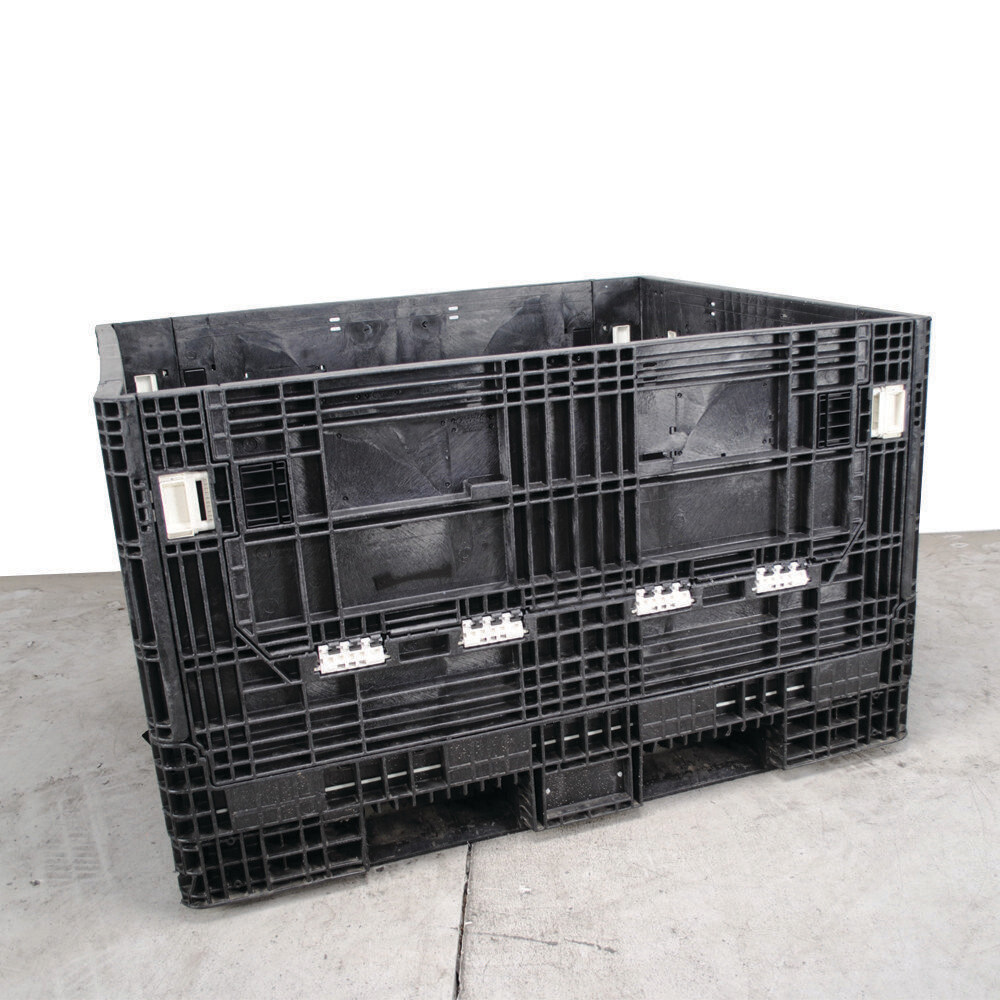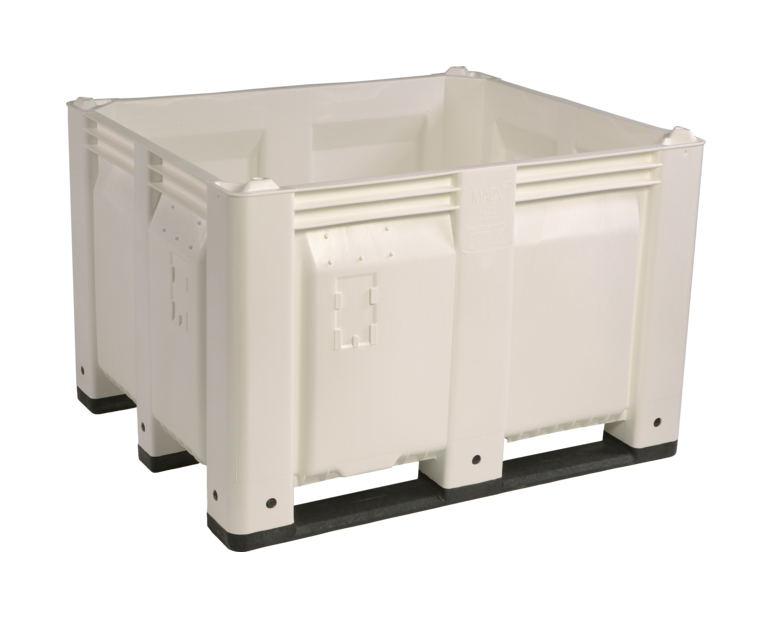Enhance your workspace efficiency using used collapsible containers for storage and delivery
The Ultimate Overview to Selecting the Right Bulk Containers for Your Company Needs
Choosing the ideal bulk containers is vital for any type of business that relies upon efficient logistics. Various sorts of containers exist, each designed for certain materials and applications. Factors such as size, product compatibility, and governing criteria play a significant role in this decision-making procedure. Understanding these aspects can cause boosted functional performance. Many companies overlook important elements that might enhance their overall efficiency and sustainability. What are these factors to consider?
Comprehending Various Kinds Of Mass Containers
Mass containers work as crucial devices for organizations looking for efficient storage and transportation options. These containers can be found in various types, each developed to fulfill specific operational demands. One usual kind is the intermediate mass container (IBC), which is perfect for granulated and fluid materials, providing a balance of capacity and ability to move. An additional prominent alternative is the mass bag, or FIBC, suitable for dry, flowable products. These adaptable containers are lightweight and can be conveniently carried and saved. For heavier products, inflexible mass containers are usually utilized, offering toughness and security for risk-free handling. Additionally, there are specialized containers tailored for hazardous materials, guaranteeing conformity with security regulations. Comprehending the distinctive characteristics of these bulk container types enables services to make educated decisions that maximize logistics and lower prices. By picking the right container, firms can improve their operational efficiency and enhance their supply chain processes.
Secret Product Considerations for Bulk Containers
When picking mass containers, it is necessary to consider the products utilized in their building. Factors such as strength, chemical, and durability compatibility play a vital role in making sure the containers fulfill details functional needs. Furthermore, weight and transportability worries can impact both efficiency and transport logistics.
Product Sturdiness and Strength
Longevity and stamina are essential consider selecting products for bulk containers, as they straight influence the container's capacity to stand up to numerous environmental problems and dealing with processes. Materials such as high-density polyethylene (HDPE), polypropylene, and stainless steel are commonly preferred for their robust homes, supplying resistance to temperature level, effect, and abrasion changes. The selection of product likewise impacts the general life expectancy of the container; more powerful products generally lead to much less constant replacements, leading to cost savings in time. Furthermore, the weight of the material can impact shipping expenses and convenience of handling. Organizations should consider their particular operational environments and the possibility for wear and tear to assure peak longevity and stamina in their bulk container selection.
Chemical Compatibility Factors
Understanding chemical compatibility is crucial for choosing bulk containers, as the materials utilized should withstand the specific compounds they will certainly hold. Various elements affect compatibility, including the chemical nature of the materials, temperature level, and period of storage. Destructive chemicals may call for containers made from stainless steel or specialized plastics that stand up to destruction. Furthermore, reactive substances can produce warm or gases, demanding aired vent or pressure-rated containers. The choice of container product, whether metal, polyethylene, or polycarbonate, ought to line up with the chemical residential properties of the kept compounds to avoid leaks or violations. Inevitably, a comprehensive assessment of these compatibility variables guarantees secure handling and storage, shielding both employees and the atmosphere while preserving product honesty.
Weight and Mobility Problems
Choosing mass containers involves not only reviewing chemical compatibility however also considering weight and mobility. Companies have to evaluate the simplicity of handling and transport to enhance performance. Light-weight products like high-density polyethylene (HDPE) or aluminum can help with much easier movement and decrease delivery costs. On the other hand, larger containers may provide enhanced toughness yet can hinder wheelchair, particularly in atmospheres needing constant relocation. Furthermore, the style of the container need to allow for convenient lifting and piling, making certain ergonomic safety for workers. Companies ought to additionally take into consideration the facilities readily available for transportation; for example, containers suitable with forklifts or pallet jacks can enhance procedures. Ultimately, the ideal equilibrium between weight and transportability straight affects functional efficiency and expense effectiveness.
Sizing Your Mass Containers for Optimum Efficiency
When sizing bulk containers, companies have to meticulously examine the measurements needed to accommodate their particular products. In addition, weight ability is an important element that influences performance and safety and security during transportation and storage space. Efficient sizing not only makes best use of room but also enhances functional process.
Determining Container Capacities
Picking the appropriate measurements for bulk containers is vital for taking full advantage of efficiency in storage space and transportation. Companies have to examine their specific demands, considering elements such as readily available area, the nature of the goods being stored, and the approaches of transportation utilized. Precise dimensions ensure that containers fit ideally in stockrooms and cars, decreasing lost area and lowering dealing with time. Standard sizes can use comfort, however custom-made measurements might be needed for unique demands or to accommodate certain items. Additionally, it is essential to assess stacking capacities and access, as these elements influence overall functional efficiency. Inevitably, the best dimensions cause improved organization and streamlined logistics, profiting the overall efficiency of the service.
Weight Capability Considerations
Comprehending weight ability is important for services intending to maximize their mass container performance. The weight capability of a container directly influences storage space capacities, transportation logistics, and total operational expenses. Selecting containers with the appropriate weight limits guarantees that businesses can securely save and carry their goods without running the risk of damage or compliance problems. Overwhelming containers can result in architectural failings, while underutilizing capacity results in wasted sources. It is necessary for businesses to evaluate their product weights and take into consideration any regulative needs when selecting containers. Furthermore, variables such as the sort of product, meant use, and environmental problems should also affect weight ability decisions. By assessing these components, companies can improve efficiency and assure a structured supply chain.
Governing Compliance and Security Specifications

Regulatory compliance and safety and security requirements play an essential duty in the option of mass containers for businesses. Organizations needs to assure that their containers meet numerous laws set by local, nationwide, and international authorities. These standards commonly refer to material safety and security, architectural honesty, and proper labeling, which help protect against accidents and assure the safe transport of products.
Furthermore, adherence to industry-specific guidelines, such as those from the Food and Medication Management (FDA) or the Occupational Security and Health And Wellness Management (OSHA), is critical for companies managing harmful materials or food products. Non-compliance can lead to penalties, lawful problems, or damage to an organization's track record.
Companies ought to likewise take into consideration the container's compatibility with the materials being kept or transported to stay clear of contamination or chain reaction (used collapsible bulk containers). To sum up, comprehending and carrying out governing conformity and safety and security requirements is important for the liable and effective use of mass containers
Sustainability Options for Eco-Friendly Mass Containers

Business are likewise exploring options made from recycled materials, which not just preserve resources but likewise support the recycling industry. Technologies in layout enable for lighter containers that require much less energy to transport, additionally improving sustainability. By integrating these environmentally friendly bulk container alternatives, companies can demonstrate their dedication to environmental stewardship while satisfying consumer need for sustainable techniques. This shift not just aids the earth however can likewise improve brand name track record and client commitment.
Cost-Effectiveness and Budgeting for Mass Containers
While lots of organizations concentrate on sustainability, cost-effectiveness remains an essential element when selecting mass containers. Organizations must assess the used plastic containers first purchase rate, in addition to long-lasting functional prices, to ensure economic stability. Aspects such as upkeep, sturdiness, and reusability play a considerable duty in identifying general expenditures.
Purchasing premium containers might yield higher upfront expenses however can lead to savings via minimized replacement prices and decreased waste. Additionally, businesses must consider transportation prices and storage effectiveness, as these can impact the total budget.

Frequently Asked Concerns
How Do I Figure Out the Right Container for Hazardous Products?
To figure out the best container for hazardous materials, one should evaluate compatibility with the compound, take into consideration the container's material, look for governing compliance, and assess capacity and security attributes to ensure appropriate handling and storage.
Can Bulk Containers Be Customized for Details Products?
Yes, bulk containers can be tailored for specific products. used collapsible bulk containers. Different functions, such as size, layout, and material, can be tailored to fulfill unique needs, guaranteeing optimal security and performance for transferring and keeping different items
What Is the Typical Life-span of Different Bulk Container Types?
The average life-span of bulk container kinds differs; plastic containers last 5-10 years, steel containers 10-20 years, and wooden containers normally last 3-7 years, depending on use, maintenance, and ecological conditions.
Just how Should I Tidy and Maintain Mass Containers?
To cleanse and keep bulk containers, one need to on a regular basis evaluate for damage, get rid of residue, clean with suitable cleaning agents, rinse thoroughly, and warranty correct drying before storage space. Adhering to supplier guidelines boosts durability and safety and security during usage.
Exist Rental Choices for Bulk Containers Available?
Yes, countless firms supply rental options for mass containers, offering versatility for organizations. These services can accommodate numerous demands, enabling companies to take care of supply successfully without the commitment of acquiring containers outright.
Sturdiness and stamina are crucial elements in selecting materials for mass containers, as they directly influence the container's capability to withstand numerous ecological conditions and taking care of procedures. Comprehending chemical compatibility is necessary for picking bulk containers, as the materials utilized have to resist the details materials they will certainly hold. Comprehending weight capacity is vital for companies aiming to optimize their mass container performance. Governing conformity and security requirements play an essential function in the option of bulk containers for organizations. While numerous organizations focus on sustainability, cost-effectiveness remains a critical element when choosing mass containers.